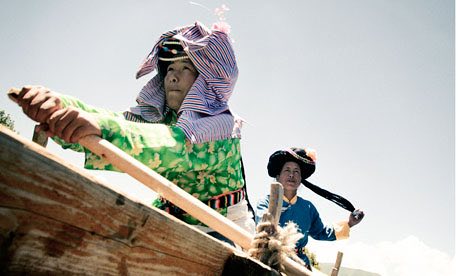
Two women row a canoe made of driftwood across a lake, their eyes fixed on a destination in the distance. The woman in the foreground bites her bottom lip with determination. There’s a steeliness in her expression that says she’s done this many times before.
In a series of exceptional photographs, Italian photographer Luca Locatelli spent a month documenting the lives of the Mosuo tribe, often described as one of the last matriarchal societies in the world. Locatelli travelled to Lugu Lake in southwest China, 2,700 metres above sea level, taking two days to reach his destination by road. There, in a valley on the border of the Yunnan and Sichuan provinces, he shadowed a society where women are in charge and where there are no words to express the concepts of “father” or “husband”.
Locatelli describes Lugu Lake as “paradise”. “The water is clear and clean and the surroundings are peaceful and beautiful – it’s perfect,” he says. Known as the “Kingdom of Women” throughout China, 40,000 Mosuo people live in a series of villages around the lake. Women here make most major decisions; they control household finances, have the rightful ownership of land and houses, and full rights to the children born to them – quite radical considering that many parts of China still practise arranged marriages – although political power tends to rest with the men (making the description “matrilineal” more accurate).

